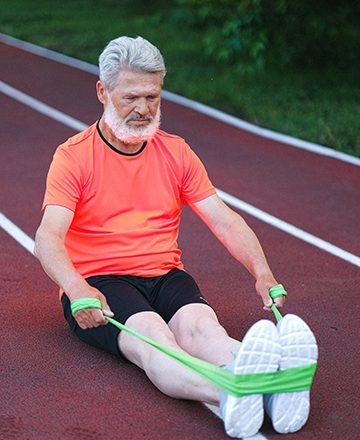Ever Tried Workouts With Bands?
 There are a lot of ways to build strength. Bodyweight workouts, battle ropes and workouts with bands or weights are a few. While most people think of weights the minute they hear strength-building, resistance bands can be just as beneficial. You have to focus more on working muscles on a variety of planes, since gravity isn’t the providing the resistance. Bands are about the resistance of the stretch.
There are a lot of ways to build strength. Bodyweight workouts, battle ropes and workouts with bands or weights are a few. While most people think of weights the minute they hear strength-building, resistance bands can be just as beneficial. You have to focus more on working muscles on a variety of planes, since gravity isn’t the providing the resistance. Bands are about the resistance of the stretch.
Resistance bands are excellent for the newbie that wants to workout at home.
Free weights and barbells are not only more expensive than bands, but also harder to store. You can tuck the bands in a drawer but need a full corner to store a complete set of weights. Bands come in different colors to indicate how much resistance they provide, but a whole pack with a variety of resistance weights would require less space than one dumbbell. They’re also far less expensive. In fact, most cost less than the shipping and handling on weights.
Your need determines what is best.
If you’re doing strength-building, but aren’t looking for a lot of bulk, then resistance bands are perfect. If you’re going for a competition bodybuilder body, look more to free weights. You can do it with resistance bands, but it requires more planning and thought. To get that type of body, you have to focus on progressive overload, increasing sets and reps as you improve and increasing intensity.
Building muscles is all about trying to move something that resists that movement.
The weight of dumbbells, kettlebells and barbells work against gravity to resist movement. It’s Newtons law of motion—an object at rest remains at rest—that helps you move the sandbags and medicine balls. With resistance bands, it’s all about the resistance of the rubbery stretch of the bands. No matter what the resistance is, when you’re going against that force, you’re building muscles. How you hold your body and move that object makes the difference on which muscles you work.
- Many people consider weights the gold standard, since it provides constant resistance, where bands only provide resistance when they’re stretched to the maximum.
- Bands can be a benefit if you’re bored with regular weights. They’re excellent for the home gym and great for people who travel frequently. They’re also good for flexibility training and rehabbing muscles.
- Bands let you train differently. The difference allows a more well-rounded approach to your workout, since they also help stabilizing muscles. While you may not want to make them your only tool, they’re a good addition to a well-rounded program.
- Some people don’t use resistance bands, since they’re allergic to latex. They now come in a non-latex version. Always inspect your bands for wear and tear before every workout.
For more information, contact us today at Iron Fit



















